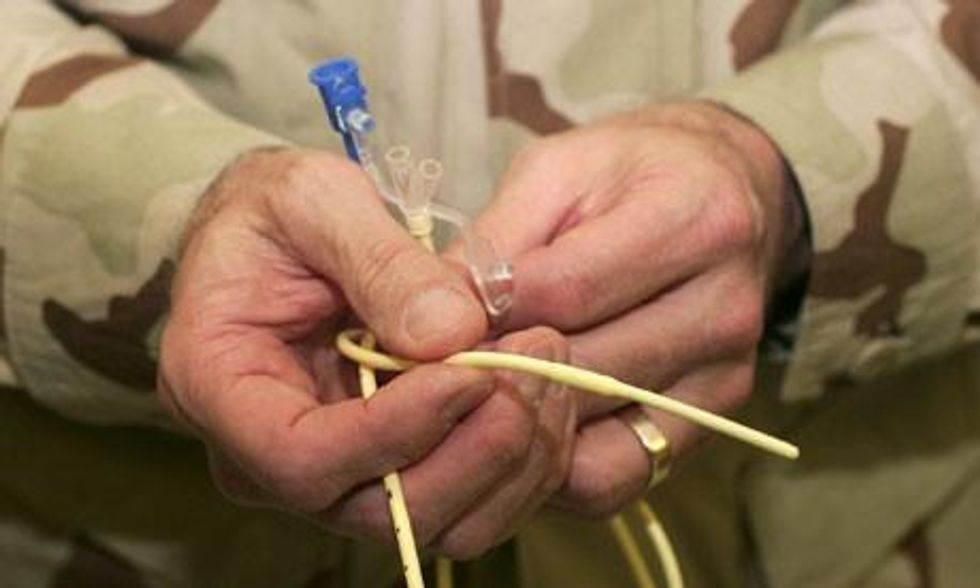More than 100 of the detainees held at Guantanamo are engaged in a hunger strike as a desperate form of protest. Warding off the political repercussions that their deaths would bring, the Obama administration is now forcibly feeding more than a third of them. The US government's response, however, is legally untenable. The government, effectively by its own admission and official policies, is acting in clear violation of the international laws of war.
The administration's own account of the law does not show that they are aware of the legal problem. And a recent joint letter by human rights groups calling for an end to forced feeding invokes the laws of war. But it also overlooks this clear and direct legal violation.
Globally accepted standards of medical ethics - set forth by the World Medical Association in 1975 and 2006 - categorically forbid doctors from force-feeding competent prisoners who voluntarily engage in a hunger strike. The Association's 2006 Malta Declaration states unequivocally:
"Forcible feeding is never ethically acceptable."
And the American Medical Association has repeatedly affirmedthese core ethical standards, most recently in a letter to the US secretary of defense.
The Obama administration's response is that it is obligated to respect the laws of war, not international standards of medical ethics. As a senior administration official recently stated:
"The World Medical Association is a private organization; its pronouncements do not create legal requirements for states. There is no international law requirement to allow detainees to starve themselves or harm themselves."
And the president has expressed his ethical concerns, remarking:
"I do not want these individuals to die."
The problem for the president - the legal problem - is that the law precludes him from making such an ethical choice. And rather than simply a pronouncement of a private organization, the World Medical Association's declaration has the force of binding law in armed conflicts.
The law of war defines the legal obligations that apply in the medical treatment of detainees by direct reference to international standards of medical ethics. The additional protocols to the Geneva Conventions, which nations of the world codified in 1977, state explicitly that it is prohibited to subject detainees to "any medical procedure" that "is not consistent with generally accepted medical standards which would be applied under similar medical circumstances to persons who are nationals of the party conducting the procedure and who are in no way deprived of liberty." And the protocol also prohibits compelling medical personnel "to perform acts or to carry out work contrary to the rules of medical ethics". Although the United States has not ratified the protocol, the government considers these provisions binding international law.
The process of forcibly feeding individuals at Guantanamo surely constitutes a "medical procedure". But in case there were any doubt on this point, the most authoritative source on the interpretation of the protocol explains, by way of an example, "a doctor who prescribes a diet is certainly performing a medical procedure". And what exactly are "generally accepted medical standards"? The same authority goes on to explain that these standards are reflected in declarations and rules adopted by none other than the World Medical Association.
The quoted text from the Geneva protocol makes one other point plain: it is a false comparison to justify any procedures at Guantanamo by referring to the policies of forced-feeding in US prisons. The architects of the rules of warfare decided that the proper comparison is to treatment of the US population at large. And the US government does not force-feed citizens in their homes.
By its own standards, the Obama administration cannot continue the present course of action. The US supreme court has held, and the administration has accepted, that its power to detain in accordance with Congress's authorization to use military force depends on faithful compliance with the law of war. The administration's response to the hunger strikers violates international law and thus lacks domestic authority. The government needs to find a different, and legal, way out of the dilemma at Guantanamo.


